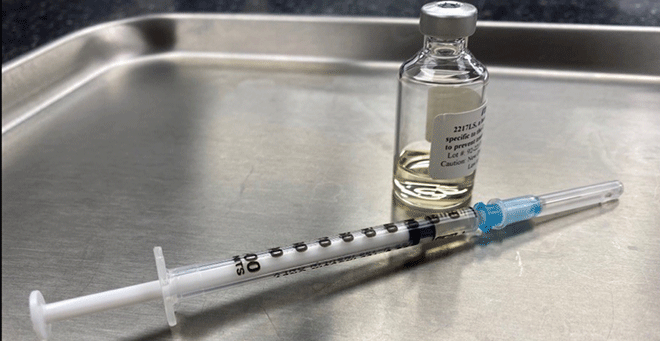As the year comes to a close, the Office of Communications is rerunning some of the big stories we covered in 2021, including the launch of the UMass Chan Medical School-led volunteer Vaccine Corps, the ribbon cutting for the community-based outpatient clinic for veterans on the Medical School campus and the $175 million transformational gift from The Morningside Foundation that led to our name change. Look for these stories on UMassMed News between Dec. 22 and Dec. 30. This story was originally published on Feb. 24, 2021.
The first human clinical trial of Lyme PrEP, a seasonal shot to prevent Lyme disease, has begun enrolling volunteers to evaluate the safety and pharmacology of the treatment. A pre-exposure prophylaxis developed at MassBiologics of UMass Medical School, Lyme PrEP uses a monoclonal antibody that protects against the disease. Approximately 60 volunteers will be enrolled in the Phase I trial.

“This is an exciting milestone,” said Mark Klempner, MD, executive vice chancellor for MassBiologics and professor of medicine. “There is a real unmet public health need for the prevention of Lyme disease. There are more than 30 years of clinical experience that says a monoclonal antibody will be safe. The bigger question we hope to answer is how long will the antibody last in the circulation so when a tick bites you will be protected from Lyme disease.”
Lyme disease is the most common vector-borne disease in the United States. It is caused by the bacterium Borrelia burgdorferi and rarely, Borrelia mayonii, and is transmitted to humans through the bite of infected blacklegged ticks. When an infected tick bites someone and begins to feed on their blood, Lyme-causing bacteria can slowly travel from the tick’s gut to its salivary glands and then transfer the bacteria to the site of the bite.
Typical symptoms include fever, headache, fatigue and a characteristic skin rash. If left untreated, infection can spread to joints, the heart and the nervous system. Most cases of Lyme disease can be treated successfully with a few weeks of antibiotics. The only ways to prevent infection are to prevent tick bites by using insect repellent and removing ticks promptly.
MassBiologic’s Lyme PrEP prevents infection by delivering a single, human anti-Lyme antibody, or blood protein, directly to a person rather than triggering their own immune system to make many antibodies as vaccines do. If a person’s blood contains antibodies against the bacteria, the antibodies can kill Borrelia in the tick’s gut before the bacteria has a chance to travel to the salivary glands, thereby preventing transmission to the human.
The U.S. Food and Drug Administration approved a vaccine, called LymeRx, against Lyme in 1998, but it had limitations and was taken off the market three years later. That vaccine targeted the outer protein of the bacteria that causes Lyme. It needed to be administered by multiple injections over a year before immunity developed. Uncertainty about the length of immunity from the vaccine also raised questions of whether a booster shot would be regularly needed.
“Through our research, we realized that just one of the antibodies that the human body developed after multiple injections of the LymeRx vaccine was sufficient to prevent infection,” said Dr. Klempner. “We identified the single antibody that led to immunity and tested it in animals where it proved 100 percent effective.”
Preclinical studies by MassBiologics demonstrated that Lyme PrEP gives protection immediately upon injection, as it circulates through the blood. Unlike a vaccine which induces antibodies that may not contribute to protection but can cause side effects, this approach uses a single, defined antibody, thus reducing the risk of side effects.
“The goals for the Phase I clinical trial, which began last week, are to test for the safety of Lyme PrEP and to determine how long it lasts in the bloodstream in humans,” said Klempner.
This initial clinical trial is being done in the Upper Midwest region of the United States where Lyme disease is not endemic. The location was chosen so that clinicians can avoid testing the Lyme PrEP antibody on volunteers who may have already been exposed to the Lyme bacteria and have developed responses to the bacteria that could confuse the results.
Related media coverage:
WBUR: Human Testing Begins On Springtime Lyme Disease Shot Developed In Mass.
Related stories on UMassMed News:
LISTEN: How monoclonal antibodies can help fight infectious diseases, such as Lyme disease
A Lyme disease vaccine doesn’t exist, but a yearly antibody shot shows promise at preventing infection
STAT: Lyme disease preventative developed at UMMS moves closer to clinical trial
Preventive shot for Lyme disease, developed at UMass Medical School, moving forward